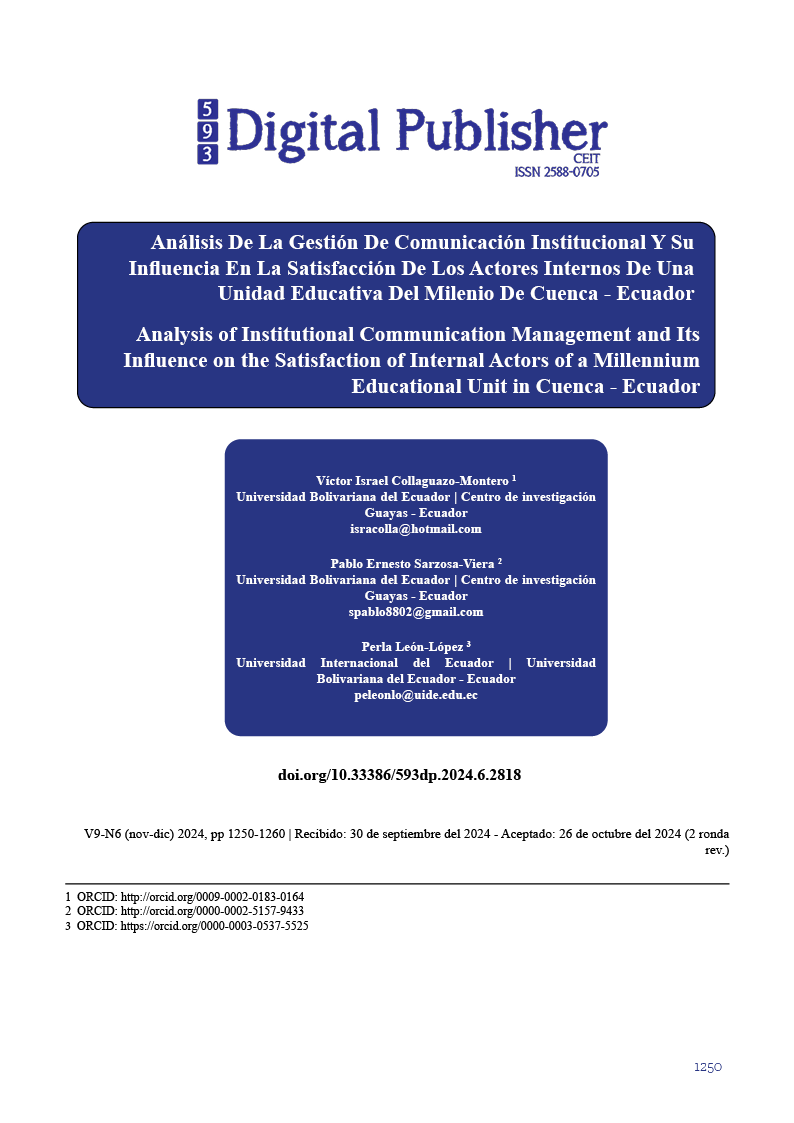Analysis of Institutional Communication Management and Its Influence on the Satisfaction of Internal Actors of a Millennium Educational Unit in Cuenca - Ecuador
Main Article Content
Abstract
Effective institutional communication is crucial for the optimal functioning of educational units. This study analyzes the management of institutional communication and its influence on the satisfaction of internal stakeholders in a Millennium Educational Unit in Cuenca, Ecuador. The main objective is to analyze the management of institutional communication and its influence on the satisfaction of internal stakeholders in a Millennium Educational Unit in Cuenca, Ecuador. The methodology used was descriptive, with a documentary review and correlational analysis with a mixed approach. Perception surveys were applied to authorities, teachers, and high school students, and internal documents of the institution were reviewed. Significant areas for improvement in institutional communication were identified, showing a positive correlation between the quality of communication and academic performance and organizational climate. The surveys applied to teachers and students describe a general dissatisfaction with communication channels, highlighting an excessive dependence on informal channels such as WhatsApp. In general, only 31% of students and teachers are satisfied with communication. According to these results, a communication plan for the institution is recommended to address the identified areas of concern and thus improve the satisfaction and functioning of the educational community.
Downloads
Article Details

This work is licensed under a Creative Commons Attribution-NonCommercial-ShareAlike 4.0 International License.
1. Derechos de autor
Las obras que se publican en 593 Digital Publisher CEIT están sujetas a los siguientes términos:
1.1. 593 Digital Publisher CEIT, conserva los derechos patrimoniales (copyright) de las obras publicadas, favorece y permite la reutilización de las mismas bajo la licencia Licencia Creative Commons 4.0 de Reconocimiento-NoComercial-CompartirIgual 4.0, por lo cual se pueden copiar, usar, difundir, transmitir y exponer públicamente, siempre que:
1.1.a. Se cite la autoría y fuente original de su publicación (revista, editorial, URL).
1.1.b. No se usen para fines comerciales u onerosos.
1.1.c. Se mencione la existencia y especificaciones de esta licencia de uso.
References
De Vries, R. E., Bakker-Pieper, A., & Oostenveld, W. (2019). Leadership = Communication? The relations of leaders’ communication styles with leadership styles, knowledge sharing and leadership outcomes. Journal of Business and Psychology, 25(3), 367-380. https://doi.org/10.1007/s10869-009-9140-2
Gracia Borbor Kelly Emely. (2013). La Comunicación Institucional. https://repositorio.upse.edu.ec/bitstream/46000/3786/1/UPSE-TCS-2013-0008.pdf
García-Peñalvo, F. J. (2021). Digital transformation in education: The role of communication and technology. Education in the Knowledge Society, 22(1), 1-16. https://doi.org/10.14201/eks.23798
Lee, K., & Choi, H. (2020). Internal communication and employee engagement in educational institutions. Journal of Educational Leadership, Policy, and Practice, 35(1), 19-30. https://doi.org/10.1177/1558689820927253
Ley Orgánica de Educación Intercultural (LOEI). (2011). Registro Oficial Suplemento 417, 754. https://educacion.gob.ec/wp-content/uploads/downloads/2019/10/Ley-Organica-de-Educacion-Intercultural-actualizacion-2018.pdf
Mackenzie, L. (2020). Políticas de bilingüismo en Colombia: Implicaciones en la justicia social y el impacto de la gestión educativa. Current Issues in Language Planning, 21(2), 117-134. https://doi.org/10.1080/14664208.2019.1615743
Martínez, P. (2018). La comunicación interna como herramienta de gestión en las organizaciones educativas. Revista de Comunicación y Gestión, 14(1), 85-99.
Martínez-Prieto, D., & Lindahl, K. (2020). El impacto de las políticas lingüísticas en la identidad docente: Influencia de la comunicación institucional. TESOL Journal, 11(3). https://doi.org/10.1002/tesj.514
Ordóñez-Ordóñez, C. L. (2018). Aprendizaje y comunicación en la formación de maestros en Colombia: Gestión efectiva de la comunicación en el ámbito educativo. Revista Colombiana de Educación, 75, 187-214. https://doi.org/10.17227/rce.num75-8108
Porras, J. I., & Robertson, P. J. (2019). Organizational communication and team cohesion in educational settings. Psychology and Education Journal, 57(3), 120-135. https://doi.org/10.1037/edu0000416
Pulido, Santamaría (2008). El enfoque integral como concepción de la investigación científica en la esfera educacional. https://mendive.upr.edu.cu/index.php/MendiveUPR/article/view/299
Salinas, J., & De Benito, B. (2020). Educational innovation and digital transformation: The role of ICT in educational management. Journal of Educational Technology & Society, 23(4), 48-61. https://www.jstor.org/stable/26919029
Suárez, M. N., Torres, R. R., Sevilla-Vallejo, S., Álvarez, Y. M., Gómez, S. V., Ramón, J. E., & Pérez, N. M. (2023). La gestión educativa en la educación escolarizada. Reflexiones teóricas para la práctica. Quito: Qualitas. https://doi.org/10.55867/libroqual23.01
Vizcaíno Zúñiga , P. I., Cedeño Cedeño , R. J., & Maldonado Palacios , I. A. (2023). Metodología de la investigación científica: guía práctica. Ciencia Latina Revista Científica Multidisciplinar, 7(4), 9723-9762. https://doi.org/10.37811/cl_rcm.v7i4.7658



